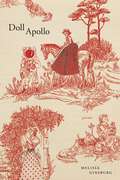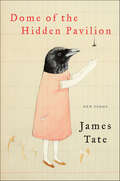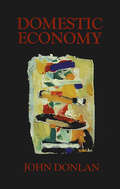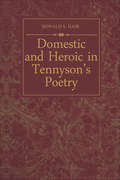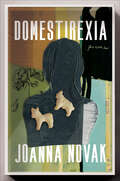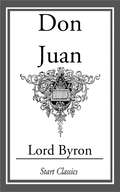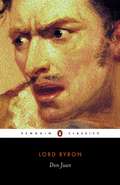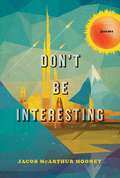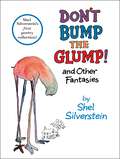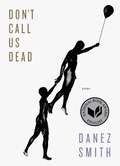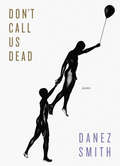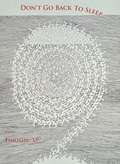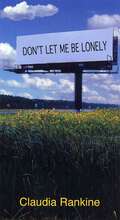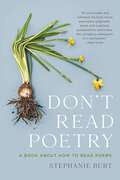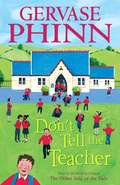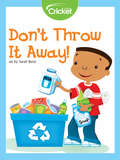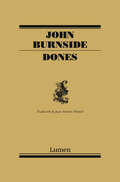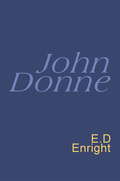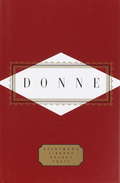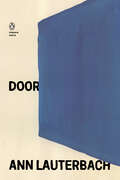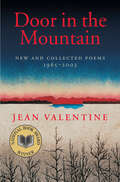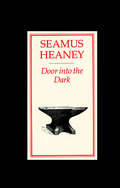- Table View
- List View
Doll Apollo: Poems
by Melissa GinsburgWith lush imagery and surprising syntactical turns, the poems in Doll Apollo merge mythology with close attention to the patterns, colors, and contours of the material world. Through the figure of the paper doll, the hoax conspiracy surrounding the Apollo moon landing, and lyrics embedded with violence and beauty, Melissa Ginsburg’s feminist ecopoetics weaves the domestic and celestial into considerations of female identity, desire, spiritual yearning, and doubt. Throughout, Doll Apollo remains rooted in scenery and music, as Ginsburg embraces her subjects with humor and verbal and formal play.
Doloras y humoradas
by Ramón De CampoamorDoloras y humoradas Ramón de Campoamor Campoamor llegó a ser el poeta más leído de su tiempo, pero fue sólo por la oposición al desenfreno de los románticos, porque ofreció un tono distinto a la poesía. El fenómeno de la inmensa popularidad de Campoamor surge, precisamente, por el agotamiento verbal del siglo romántico. Cuando se yergue sencillo, jovial, con su gran facilidad versificadora y su imaginación inagotable para crear situaciones filosófico-pueblerinas, barre con todo lo que encuentra a su paso. Entonces, las abuelas suspiran al conjuro de la niña enamorada que acude al señor cura para hacerle una carta a su amor, porque "¡quién supiera escribir!" Campoamor creó las doloras y las humoradas. Las primeras son poemas dramáticos breves, envueltos en cierta ironía ante los reveses de la vida. Las segundas son casi lo mismo, pero dotadas de buen humor no exento de sentimentalismo. La Real Academia Española fija el nacimiento de la dolora hacia 1846, y las humoradas fueron publicadas entre 1886 y 1888. El propio Campoamor las calificó de "rasgo intencionado de tendencia comicosentimental".
Dolphin's Big Leap: Hello Reader Level 1 (Hello Reader!)
by Kimberly WeinbergerLittle Dolphin lives under the sea with a family of other dolphins who jump and swim around but he lacks the courage to jump as other dolphins do. He finds his courage when he wants to impress a child he sees on a boat. This short book contains ideas for helping a young child learn to read. The Pictures are described.
Dome of the Hidden Pavilion: New Poems
by James TateThe seventeenth book of verse from one of America’s finest and most acclaimed contemporary poets—winner of the Pulitzer Prize and the National Book Award.Capturing his inimitable voice—provocative, amusing, understated, and riotous all at once—the poems in Dome of the Hidden Pavilion demonstrate James Tate at his finest. Innovative and fresh, they range in subject from a talking blob to a sobering reminiscence of a war and its aftereffects.Though they are diverse in scope, a theme of dialogue and communication—and often miscommunication—links these poems. Accessible yet subtly surrealist, filled with dark wit, dry humor, and a deceptive simplicity, Dome of the Hidden Pavilion confirms Tate’s continuing relevance as one of the most celebrated American poets of the modern age.
Domestic Economy
by John DonlanA sequence of fifty dated poems, four quatrains each; lyrical arguments; quick thinking amid the rational absurdity of everyday machinery; intuitive explorations of unknown energies; a diary of the unconscious.
Domestic and Heroic in Tennyson's Poetry
by Donald HairTennyson shared the assumptions of his age concerning the value of family life, and treated the domestic as the source of the heroic in both action and character.This book provides a critical examination of these major Victorian themes as they appear in Tennyson's poetry and demonstrates how the poet's assumptions illuminate his use of elegy, idyl, and epyllion and his treatment of romance.Professor Hair analyses In Memoriam, the English Idylls, The Princess, and Idyls of the King; he examines Tennyson's view of the family as the model of social order, a civilizing influence on the nation, and a place where the greater man, or hero, is nurtured; and he reveals how much of Tennyson's poetry explores the link between domestic and heroic.He also discusses the patterns into which these pervasive domestic concerns fall, with emphasis on the most significant: separation and reunions. The myth of Demeter and Persephone, the Biblical story of Ruth, and the Sleeping Beauty fairy tale are all versions of Tennyson's treatment of this pattern.The English Idylls and other idyls and epyllia are explored as varying combinations of romance, satire, tragedy, comedy, and irony, with a detailed analysis of The Princess, the most complex of these medleys. Idylls of the King, wherein the fate of Camelot rests on the marriage of Arthur and Guinevere, is treated as the fullest exploration of the link between domestic and heroic.
Domestirexia: Poems
by JoAnna NovakA poetry collection contorting the idea of home away from being a site of comfort and nourishment by coaxing the reader to think about domesticity in knotty new waysDomestirexia goes beyond the entanglement of "domestic" and "anorexia&” exploring a behind-closed-doors sensuality, borne in the concept of making home.Home can be a space of both resistance and discomfort that one desires or takes pleasure in enjoying. Rote notions of home and the domestic are reimagined in these poems as estranging, excessive, and populated by unknowable characters. Exploring themes of family, sacrifice, disease, death, money, cooking, romance, sex, art, and the visceral qualities of the everyday, the poems twist themselves into binds for the reader to undo or surrender to.Quarantined at her in-law&’s house during Covid, Novak wrote these poems while watching The Great British Baking Show, reading The Seven Habits of Highly Effective People, skimming Grimm Brothers fairy tales, and babysitting an infant. These are poems about wanting to misbehave. Light voyeurism at home, with gin and cake.
Don Juan
by Lord ByronDon Juan is a long, digressive satiric poem by Lord Byron, based on the legend of Don Juan, which Byron reverses, portraying Juan not as a womaniser but someone easily seduced by women. It is a variation on the epic form. Unlike the more tortured early romantic works by Byron, exemplified by Childe Harold's Pilgrimage, Don Juan has a more humorous, satirical bent. Modern critics generally consider it to be Byron's masterpiece. Byron completed 16 cantos, leaving an unfinished 17th canto before his death in 1824. Byron claimed that he had no ideas in his mind as to what would happen in subsequent cantos as he wrote his work.
Don Juan
by Lord ByronByron's exuberant masterpiece tells of the adventures of Don Juan, beginning with his illicit love affair at the age of sixteen in his native Spain and his subsequent exile to Italy. Following a dramatic shipwreck, his exploits take him to Greece, where he is sold as a slave, and to Russia, where he becomes a favourite of the Empress Catherine who sends him on to England. Written entirely in ottava rima stanza form, Byron's Don Juan blends high drama with earthy humour, outrageous satire of his contemporaries (in particular Wordsworth and Southey) and sharp mockery of Western societies, with England coming under particular attack.
Don't Be Interesting: Poems
by Jacob Mcarthur MooneyDon't Be Interesting is a collection that grapples with 'The Future' as public morality-keeper and private reckoner. The book explores the lines dividing the present from both the future and the past. Its channels include all the breadth of mass experience, from film and sport to science fiction novels, war, history, technology, and biography. Part travelogue, the book dredges up mid-century optimisms in Europe and America.
Don't Bump the Glump!
by Shel SilversteinIt's a zoo in here!Have you ever . . .Seen a Gritchen in your kitchen?Dared to dance with the One-Legged Zantz?Declined to dine with the Glub-Toothed Sline? You haven't? Well then, step inside—but only if you are ready to be amazed, tickled, astonished, and entertained by this most unusual bestiary of silly and scary creatures.Shel Silverstein combined his unique imagination and bold brand of humor for his first poetry collection—the only one he illustrated in full color. Now celebrating fifty years, Don't Bump the Glump! and Other Fantasies was originally published in 1964, the same year as his most famous picture book, The Giving Tree.
Don't Call Us Dead: Poems
by Danez Smith<P>Award-winning poet Danez Smith is a groundbreaking force, celebrated for deft lyrics, urgent subjects, and performative power.<P> Don’t Call Us Dead opens with a heartrending sequence that imagines an afterlife for black men shot by police, a place where suspicion, violence, and grief are forgotten and replaced with the safety, love, and longevity they deserved here on earth.<P> Smith turns then to desire, mortality—the dangers experienced in skin and body and blood—and a diagnosis of HIV positive.
Don't Call Us Dead: Poems
by Danez SmithFinalist for the National Book Award for PoetryWinner of the Forward Prize for Best Collection“[Smith's] poems are enriched to the point of volatility, but they pay out, often, in sudden joy.”—The New Yorker Award-winning poet Danez Smith is a groundbreaking force, celebrated for deft lyrics, urgent subjects, and performative power. Don’t Call Us Dead opens with a heartrending sequence that imagines an afterlife for black men shot by police, a place where suspicion, violence, and grief are forgotten and replaced with the safety, love, and longevity they deserved here on earth. Smith turns then to desire, mortality—the dangers experienced in skin and body and blood—and a diagnosis of HIV positive. “Some of us are killed / in pieces,” Smith writes, “some of us all at once.” Don’t Call Us Dead is an astonishing and ambitious collection, one that confronts, praises, and rebukes America—“Dear White America”—where every day is too often a funeral and not often enough a miracle.
Don't Go Back To Sleep
by Timothy LiuDon't Go Back To Sleep answers the Sufi call to wake up to this life in the here and now where ecstasy serves its summons, inviting us to break out of the mundane quotidian. Timothy Liu winds the clock back to the Nanking Massacre in 1937, then traces its consequences on his family of origin, his mother's mental illness, his father's religious fundamentalism, and Liu's obsessive search for love. As trauma begets trauma the poems slowly accrete, and Liu takes on a legacy of poetic witness where carnal violence ultimately turns to spiritual joy.
Don't Let Me Be Lonely: An American Lyric
by Claudia RankineA brilliant and unsparing examination of America in the early twenty-first century, Claudia Rankine’s Don’t Let Me Be Lonely invents a new genre to confront the particular loneliness and rapacious assault on selfhood that our media have inflicted upon our lives. Fusing the lyric, the essay, and the visual, Rankine negotiates the enduring anxieties of medicated depression, race riots, divisive elections, terrorist attacks, and ongoing wars—doom scrolling through the daily news feeds that keep us glued to our screens and that have come to define our age.First published in 2004, Don’t Let Me Be Lonely is a hauntingly prescient work, one that has secured a permanent place in American literature. This new edition is presented in full color with updated visuals and text, including a new preface by the author, and matches the composition of Rankine’s best-selling and award-winning Citizen and Just Us as the first book in her acclaimed American trilogy.Don’t Let Me Be Lonely is a crucial guide to surviving a fractured and fracturing American consciousness—a book of rare and vital honesty, complexity, and presence.
Don't Read Poetry: A Book About How to Read Poems
by Stephanie BurtAn award-winning poet offers a brilliant introduction to the joys--and challenges--of the genreIn Don't Read Poetry, award-winning poet and literary critic Stephanie Burt offers an accessible introduction to the seemingly daunting task of reading, understanding, and appreciating poetry. Burt dispels preconceptions about poetry and explains how poems speak to one another--and how they can speak to our lives. She shows readers how to find more poems once they have some poems they like, and how to connect the poetry of the past to the poetry of the present. Burt moves seamlessly from Shakespeare and other classics to the contemporary poetry circulated on Tumblr and Twitter. She challenges the assumptions that many of us make about "poetry," whether we think we like it or think we don't, in order to help us cherish--and distinguish among--individual poems.A masterful guide to a sometimes confounding genre, Don't Read Poetry will instruct and delight ingénues and cognoscenti alike.
Don't Tell the Teacher
by Gervase PhinnBrilliantly observed as always, family, teachers, pupils and the dreaded school inspector all leap to life in this wonderfully warm and witty, brand new, poetry collection from bestseller Gervase Phinn. New kids, disobedient deputy heads, school reports and fireworks, daydreamers and embarrassing mums all make an appearance. And if read on you might even just discover the whereabouts of Colin's confiscated conkers...just don't tell the teacher!
Don't Throw It Away!
by Amy TaoReduce, recycle, and reuse. We can all help Earth, if we choose. In this poem, kids learn about the differences between recycling, compost, and hazardous waste.
Dones
by John BurnsideUno de los más recientes poemarios de John Burnside, uno de los grandes poetas británicos, y una de las contribuciones más brillantes a la poesía de nuestro tiempo. John Burnside es uno de los escritores británicos más originales y relevantes de nuestros días. Dones es uno de sus más recientes poemarios y una de las contribuciones más brillantes a la poesía de nuestro tiempo. Diáfanos e intensamente trascendentales, estos poemas logran crear una inmediata intimidad con el lector, invitado a sumergirse en el agua de unos versos cuyo canto perdura en la memoria, como una experiencia íntima.
Donne: Everyman's Poetry
by John DonneThe best of John Donne's poemsJohn Donne (1572-1631) was born into a Catholic family and studied law before sailing with Essex to attack Cadiz in 1596. He was appointed secretary to Sir Thomas Egerton, the Lord Keeper (later Lord Chancellor), in 1598, but forfeited his worldly prospects when he secretly married Ann More, Lady Egerton's niece, in 1601; he was dismissed by Egerton and briefly imprisoned. The next twelve years or so were passed in poverty, without regular employment. He entered the Church and in 1621 was made Dean of St Paul's, where he became a renowned preacher. His first collection of poems was published posthumously in 1633.
Donne: Poems (Everyman's Library Pocket Poets Series)
by John DonneThe Everyman's Library Pocket Poets hardcover series is popular for its compact size and reasonable price which does not compromise content. Poems: Donne contains Songs and Sonnets, Letters to the Countess of Bedford, The First Anniversary, Holy Sonnets, Divine Poems, excerpts from Paradoxes and Problems, Ignatius His Conclave, The Sermons, Essays and Devotions, and an index of first lines.
Don’t Read This Book, Whatever You Do!
by Kalli DakosBy turns wistful and funny, the poems in this collection capture the ups and downs of school life with uncanny accuracy. In the tradition of If You're Not Here, Please Raise Your Hand, these poems, complemented by lively drawings, speak to children's hearts, to their fears, and to the special joys found in every corner of a classroom. Ages 7-11.
Door (Penguin Poets)
by Ann LauterbachNamed a Most Anticipated Book of 2023 by LitHub A new collection of vivid, personal and provocative work from the author of Or to Begin Again, a finalist for the 2009 National Book Award in poetryIn Ann Lauterbach&’s eleventh collection, the image of a Door recurs across several poems, as she considers the perpetual dialogue between what is open and what is shut for each of us. The Door is a threshold between the inner landscape of memory, thought, imagination and dream and the outer so-called real world, which increasingly comes to us through technology&’s lens, displacing and distorting our sense of intimacy, presence and relation. What is near, and what is far away? She asks about the efficacy of language itself, when confronted by the urgent uncertainties of contemporary experience.
Door in the Mountain: New and Collected Poems, 1965-2003 (Wesleyan Poetry Series)
by Jean ValentineThis National Book Award–winning volume presents nearly forty years of the renowned poet&’s work. Between 1965 and 2003, Jean Valentine published nine critically acclaimed collections of poetry, including Dream Barker(winner of the Yale Younger Poets Award), Ordinary Things, and The River at Wolf. Spare and intensely-felt, Valentine&’s poems present experience as only imperfectly graspable. This volume gathers together all of Valentine's published poems, presenting them alongside a stunning new collection. Valentine&’s poetry is as recognizable as the slant truth of a dream. She is a brave, unshirking poet who speaks with fire on the great subjects―love, and death, and the soul. Her images―strange, canny visions of the unknown self―clang with the authenticity of real experience. This is an urgent art that wants to heal what it touches, a poetry that wants to tell, intimately, the whole life.
Door into the Dark
by Seamus HeaneyDoor into the Dark, Seamus Heaney's second collection of poems, first appeared in 1969. Already his widely celebrated gifts of precision, thoughtfulness, and musicality were everywhere apparent.
